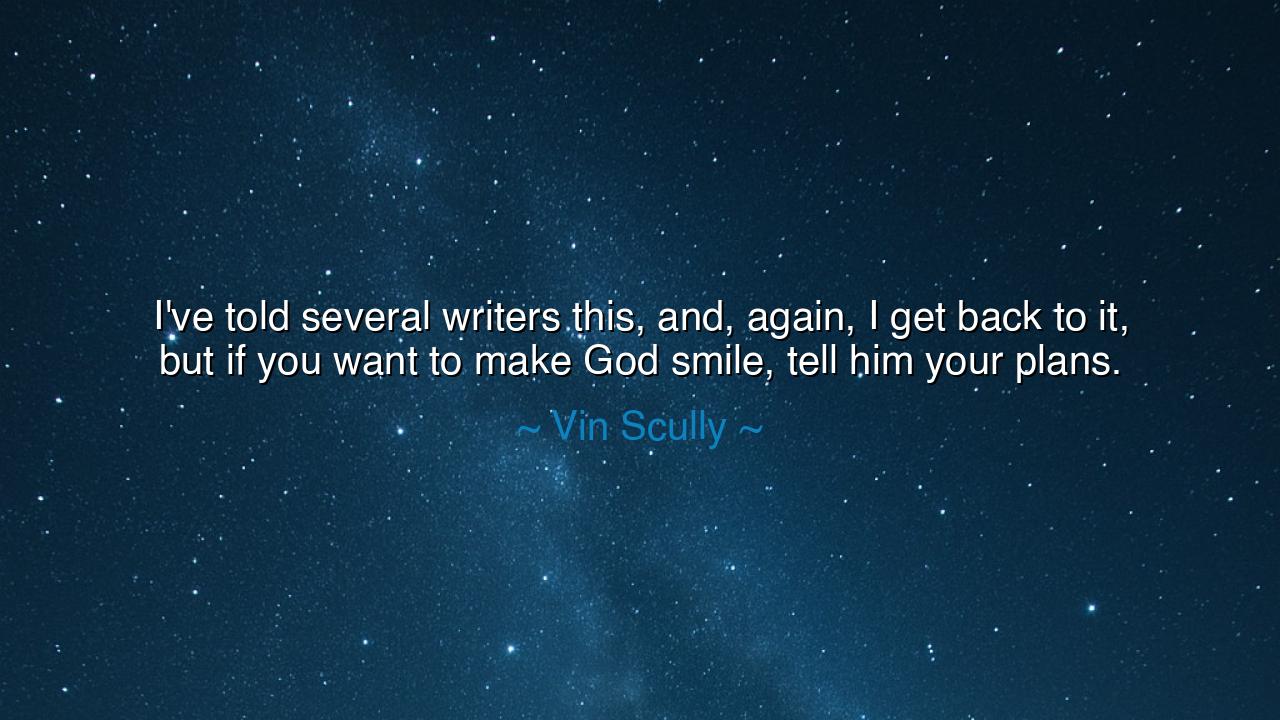
I've told several writers this, and, again, I get back to it, but
I've told several writers this, and, again, I get back to it, but if you want to make God smile, tell him your plans.






Hear the timeless words of Vin Scully, the voice of baseball’s golden age, who said: “I’ve told several writers this, and, again, I get back to it, but if you want to make God smile, tell him your plans.” Though spoken with the warmth of a storyteller, these words echo like an ancient proverb. They remind us of the fragile nature of human certainty, of the way our carefully drawn maps can be scattered by the winds of fate. To speak of our plans as though they were unshakable truth is to forget that we walk in a world governed by forces greater than our own.
The origin of this wisdom lies not in Scully alone, but in the traditions of scripture and folk wisdom. Variations of this phrase have long been spoken across cultures, often with a knowing smile. The Bible itself proclaims, “Many are the plans in a person’s heart, but it is the Lord’s purpose that prevails.” What Scully did was to carry this truth into the dugouts and press boxes of America, reminding young writers and dreamers that life does not bend to the rigid lines of our blueprints. To make God smile is to show Him our illusions of control, as though we, finite creatures, could master infinite time.
History gives us countless mirrors of this lesson. Consider Napoleon Bonaparte, who set forth with grand designs to conquer Europe, believing himself unstoppable. Yet in the snows of Russia, his plans crumbled. The empire he thought eternal dissolved in the span of years. Or recall the tragedy of the Titanic, built as an “unsinkable” ship, yet meeting its fate on its maiden voyage. These are not merely accidents of history; they are reminders of the folly of presumption. To plan is wise, but to boast of certainty is to invite the smile of God.
And yet, there is tenderness in this divine smile. It is not the cruel laugh of mockery, but the gentle smile of a parent watching a child’s earnest attempt to build castles in the sand, only for the tide to wash them away. Scully, in his wisdom, did not mean that we should not dream, or strive, or labor toward our visions. Rather, he meant that we should dream humbly, with the awareness that our destiny is not ours alone to write. The greatest victories are often born not from rigid plans, but from openness to the unexpected.
The meaning of Scully’s words, then, is to hold lightly to your designs, and to live in a posture of surrender. Make your plans, but do not be broken when they fail. For sometimes what we call failure is only the hand of God redirecting us to a greater purpose. The world is full of those who thought their journeys ruined, only to discover later that the detour was the true path. Life, like the game Scully narrated, is filled with unpredictability: a ball hops over a glove, a swing changes history, a moment alters destiny.
The lesson for us is clear: plan with diligence, but live with humility. Do not chain your heart to certainty, for certainty is an illusion. Instead, cultivate flexibility, gratitude, and faith. When your plans fall apart, do not curse heaven but look for the greater purpose hidden within. Remember that even the interruptions of life can be the true blessings. To make God smile is not failure—it is to acknowledge that we are not the masters of fate, but fellow travelers in a vast and mysterious design.
Practical action must follow. Write your goals, but hold them in open hands. When setbacks come, practice patience instead of despair. When opportunities arise unexpectedly, welcome them with courage, even if they were not part of your plan. Speak less of control, and more of trust. In every failure, ask not only, “Why me?” but also, “What now?” For it is in that openness that the hidden doors of life are revealed.
Thus the teaching is sealed: to plan is human, but to smile at the unraveling of plans is divine. Vin Scully’s words, spoken in the quiet cadence of a storyteller, remind us of an eternal truth: that God, in His wisdom, sees farther than we can dream. Let us then live with diligence, but also with surrender, knowing that in the great mystery of life, even when our plans are overturned, we are still being guided by a greater hand. And in that knowledge, we, too, may learn to smile.






AAdministratorAdministrator
Welcome, honored guests. Please leave a comment, we will respond soon